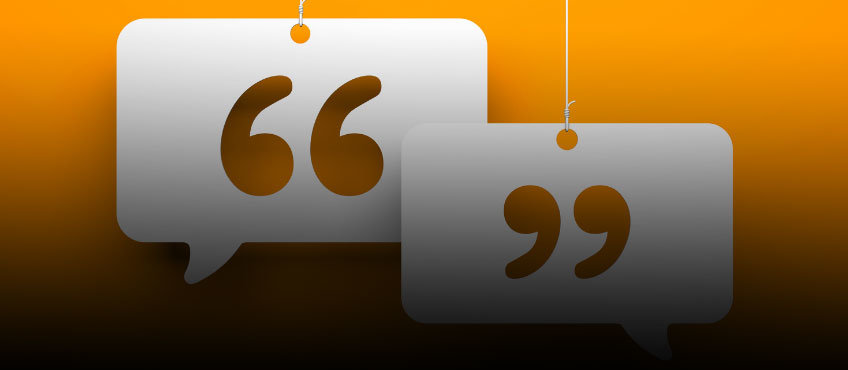Everything you need to know about using quotation marks
If you thought the first article about quotation marks was a non-stop ride of grammatical thrills and chills, hold on to your hats because part two features even more explosions of grammatical greatness! And now, without further ado, we are proud to present How to Use Quotation Marks.
1. Quotations and speech
Isolating quotations or speech from the rest of a sentence is the most common use for quotation marks. In fiction, quotation marks are used to denote when a character is speaking. In journalism, quotation marks are used to indicate that what is written is a direct quote. In academic writing, quotation marks are used to quote directly from a text. One problem we run into with our clients who write fiction is the interjection of a dialogue tag (e.g., he said) in the middle of some dialogue. The following examples will illustrate the incorrect and correct way to accomplish this:
Incorrect: "I hope, Prudence said with a tear in her eye, that you make it home one day."
Correct: "I hope," Prudence said with a tear in her eye, "that you make it home one day."
2. Scare quotes
Scare quotes are quotation marks that are typically used to indicate sarcasm or irony (e.g., It's only snowing a "little"). There's even a physical action associated with this type of quotation marks called air quotes. This use of quotation marks is familiar to us; however, scare quotes are also used in another way. In academic writing, scare quotes are used to critically discuss terms that may contain implications the author wants to personally distance him or herself from.
3. Use in meta-language
This is one of the more interesting concepts we came across in researching how to use quotation marks. Sometimes these little punctuation marks are used to distinguish a word from its associated concept. Sound a bit highfalutin'? Well, the best way to illustrate this concept is through example: The word "yogurt" is derived from an Old English word meaning stinky milk. In this example, the word is offset by quotation marks to let readers know we are talking about the actual word and not about the object to which the word refers.
4. Unusual usage
Another accepted use of quotation marks we frequently run into when editing fiction writing is when writers use quotation marks to signal the unusual usage of a word. You might, if writing a romance novel, write a sentence like this: As Prudence Goudwyfe watched Marco St. Pierre ride away on his horse to join the Red Coat Militia, she somehow "knew" she would never see her lover again. In this circumstance, the quotation marks around "knew" significantly alter the meaning of the word.
5. Incorrect usage
We typically encounter this problem when editing business documents; sometimes, marketing/business material uses quotation marks to add emphasis. We usually recommend our clients avoid using quotation marks to add emphasis because quotation marks in this context are often confused with scare quotes. I recently walked by a fairly famous Canadian restaurant with a sign outside that read: Why don't you stop in and try our new "fish" sandwich? I didn’t stop.
Conclusion
Whether you're writing a novel, an academic paper, or business/promotional material, we are here to help ensure you are using quotation marks (and all other punctuation marks) correctly. Speaking of quotes, why don't you click on our student editing services link and receive your free quote today?
Image source: Mona Eendra/Unsplash.com









